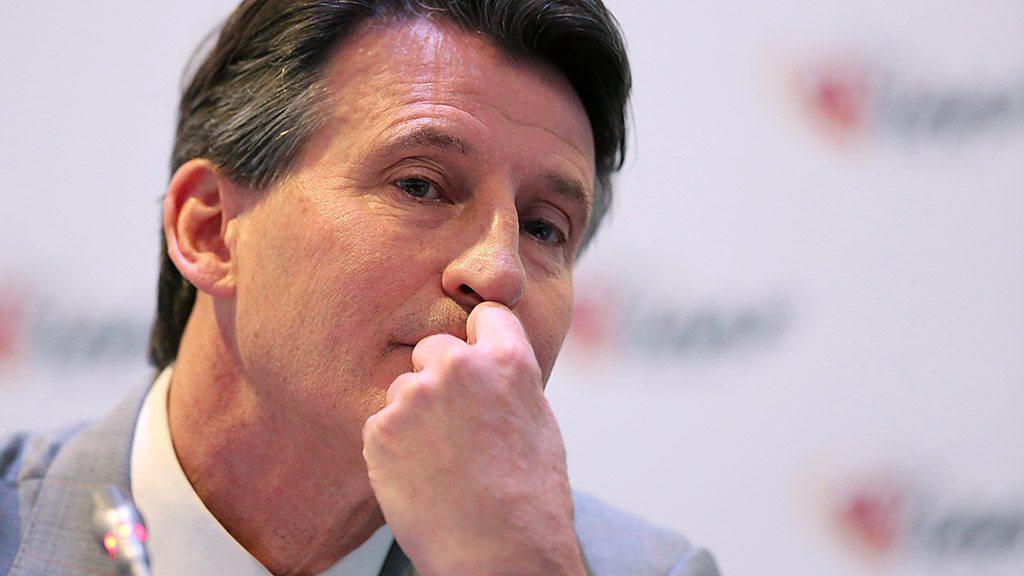IAAF: Lord Coe backed despite damning report of athletics body
- Published
Wada report: Three things learned from doping scandal
Lord Coe is the right man to lead the crisis-hit IAAF, according to the author of a report claiming "corruption was embedded" within the organisation.
Coe, 59, became boss of the body that governs world athletics last August after eight years as a vice-president.
Since then, the IAAF has come in for heavy criticism, accused of helping cover up systematic doping in Russia.
But Dick Pound, whose report damns IAAF governance, insists he "can't think of anyone better" than Coe to lead it.
"I think it's a fabulous responsibility for the IAAF to seize this opportunity and, under strong leadership, to move forward," said Pound, chairman of the independent World Anti-Doping Agency (Wada) panel which wrote the report.
"There's an enormous amount of reputational recovery that needs to occur here and I can't think of anyone better than Lord Coe to lead that."
IAAF is not in denial - Lord Coe
Pound's 89-page report concluded that corruption within the IAAF "cannot be blamed on a small number of miscreants".
It was also particularly scathing of former IAAF president Lamine Diack, who stood down and was replaced by Coe after 16 years in charge.
It concluded the Senegalese was "responsible for organising and enabling the conspiracy and corruption that took place in the IAAF".
The report also claimed the IAAF Council, which included Coe, "could not have been unaware of the extent of doping in athletics".
Coe, a former British MP, was present at Pound's news conference, having insisted on Wednesday there had been no cover-up.
He also said he had no intention of standing down.
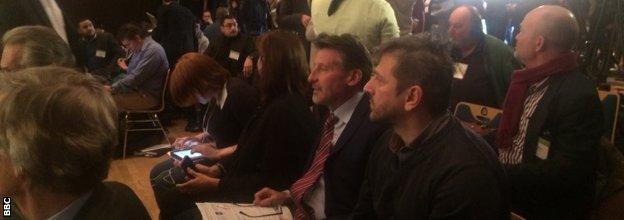
Lord Coe sat with members of the press at Pound's news conference
Following the report's publication, Coe admitted: "I know how serious this is. We are a failed organisation.
"I'm sorry if my language has in any way demonstrated a sort of a lack of understanding about the depth of this."
He told BBC Sport that the IAAF - the International Association of Athletics Federations - would "redouble our efforts, to be clear to people we are not in denial".
And Coe re-emphasised: "My responsibility is to absorb the lessons of the past and to shape the future. The changes I am making will do that. The road back to trust is going to be a long one."
Just how damning is the report?
Diack is firmly in the line of fire. The report also concluded he:
appeared to have created a close inner circle which functioned as "an informal illegitimate governance structure" outside the IAAF;
sanctioned and appeared to have had personal knowledge of the fraud and the extortion of athletes carried out by the actions of the illegitimate governance structure he put in place.
told a lawyer he was "in a difficult position" over Russian athletes accused of doping before the 2013 World Championships in Moscow, that "could only be resolved by President Vladimir Putin of Russia with whom he had struck up a friendship".
This section of the report is particularly scathing:
"The corruption that occurred within the IAAF was not at the level of some foreign currency trader in a bank carrying out unauthorised transactions, without the knowledge or permission of the responsible bank officers.
"Here it started with the president of the organisation. It involved the treasurer of the organisation. It involved the personal counsel of the president, acting on instructions of the president. It involved two of the sons of the president. It involved the director of the medical and anti-doping department of the IAAF.
"The corruption was embedded in the organisation. It cannot be ignored or dismissed as attributable to the odd renegade acting on his own.
"The IAAF allowed the conduct to occur and must accept its responsibility. Continued denial will simply make it more difficult to make genuine progress."
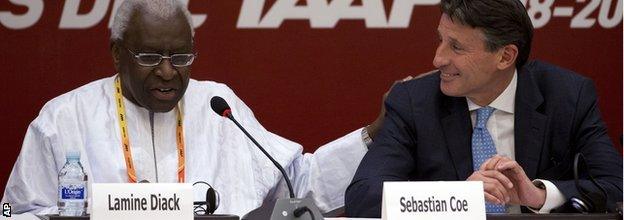
Coe said of Diack: 'He will always be our spiritual president and he will certainly be my spiritual president'
Watch Pound respond to tough questions
BBC sports editor Dan Roan quizzed the former boss of Wada.
Lord Coe did not lie - Pound
A new low for the IAAF?
It was already reeling from a number of damaging revelations and was strongly criticised for its failure to tackle doping.
In fact, it was only after Pound accused Russia of systematic doping practises in the first part of his report last November that the IAAF stepped in and banned Russian athletes from competition.
Pound said: "The commission has been troubled by the apparent unwillingness of the IAAF to acknowledge that the conduct does indeed reflect on the IAAF and that it must assume its responsibilities for what went wrong."
Worse could follow for the IAAF, too. French police have issued a 'wanted' notice via Interpol for Papa Massata Diack, the son of the former IAAF president Lamine, on charges of corruption and money-laundering.
What now for Coe?
On the day of his election in August, Coe said suggestions his organisation was complicit in a doping scandal were "just inaccurate".
Thursday's allegations call into question that argument.
They also add to the pressure on a man who has been a key figure within the IAAF since 2007, when he was made a vice-president.
The report says Coe's right-hand man Nick Davies, who stepped aside from his position as the association's chief of staff last month, was "well aware of Russian 'skeletons' in the cupboard".
Coe, who led London's successful staging of the 2012 Olympics and Paralympics, became IAAF president last year.
In an IAAF statement hours after the report was published, it said it "fully acknowledges and accepts the extreme gravity of the commission's findings".
In the statement, Coe said he "cannot change the past", but would "not repeat its mistakes".
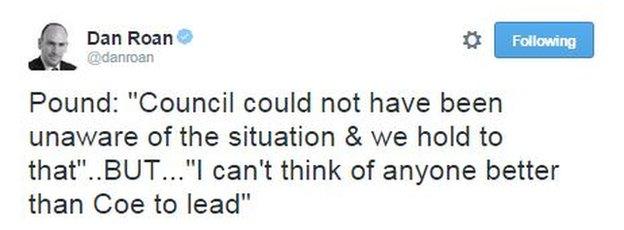
BBC sports editor Dan Roan was in Munich for the release of the report
Can he survive?
Coe has again come out out fighting, as he did following part one of the Wada report - and he still has his backers. There's Pound, for a start, as well as Brendan Foster - the British former long-distance runner - who said his close friend was still the right man to lead the IAAF.
"He's hurting with all this," said the former British middle-distance runner, prior to Thursday's announcement. "But Seb Coe is determined like no-one else can be determined. He's going to change this thing."
Michele Verroken, the former head of anti-doping at UK Sport, is also backing Coe to lead the IAAF out of trouble.
"If not Seb, who?" she asked. "Quite honestly, he is very capable of doing this. It's a matter of whether he gets the support to do it."
Who has said what?

Former British heptathlete Kelly Sotherton
IAAF ambassador Kajsa Bergqvist, Sweden's world and European champion and an Olympic bronze medallist, said she met Diack 15 to 20 times and that he "was always a person probably more interested in the power his office gave him than he was in the sport itself".
Wada president Craig Reedie called the actions "criminal" and "hugely disturbing", while sports minister Tracey Crouch said the findings of the report were "extremely alarming".
Former Great Britain athletes Roger Black and Kriss Akabusi both said there were no major surprises in the report, and backed Coe, as did marathon world record holder Paula Radcliffe.
She said: "To single out Seb that he had an inclination of what was going on - I don't believe he did. I believe he had heard rumours, knew things needed to change, which is why put he put himself on the line and ran for presidency.
"If we attack and attack, then he might say 'it is not worth it'. It is then athletics' loss."
However, Akabusi described the IAAF president as "naive" for not being aware of the scale of Russian doping.
"He was a world-class athlete and he's going to need to be a world-class administrator and politician now," said Akabusi.
Meanwhile, Russia sports minister Vitaly Mutko called the report "absurd", claiming it was "almost accusing" the nation's president Vladimir Putin "of doping".
Analysis
BBC Radio 5 live athletics correspondent Mike Costello:
"Lord Coe's reputation is on the line, especially with what he's been saying about Lamine Diack being the 'spiritual leader' of the sport.
"Time after time he said there was no cover-up, but of course there was a cover-up, Wada chairman Dick Pound said today.
"There has to be some guilt by association for Coe. Yet within athletics there is a feeling that if not Seb Coe then who else?"
BBC Radio 5 live sports news correspondent Richard Conway:
"Athletics is still in a grip of a huge crisis and the report shows deep-rooted corruption within the IAAF.
"Lord Coe says he is the right man to lead the organisation but given the report said the ruling council, which Coe was a member of, could not have been unaware of doping problems, that is going to be a significant issue for him.
"Yet that backing from Wada chairman Dick Pound is crucial because without it Coe would be facing a tougher task to keep his role as IAAF president.
"Now he has a bit of political capital to take forward."
- Published14 January 2016
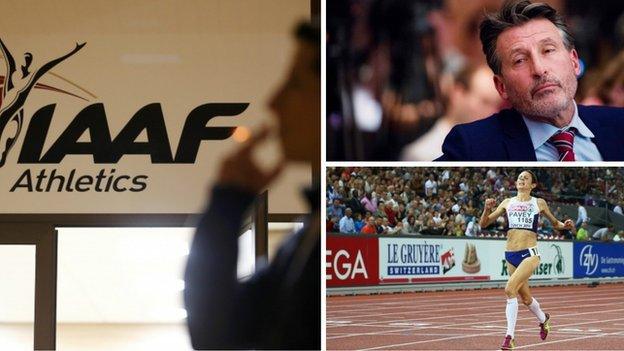
- Published12 January 2016
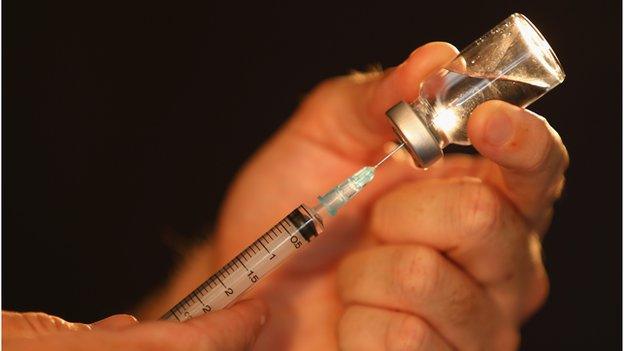
- Published11 January 2016
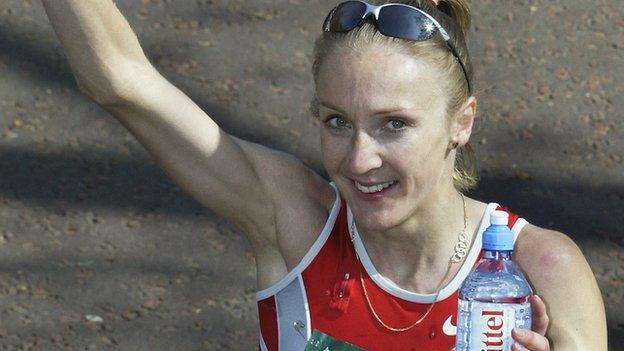
- Published14 January 2016
